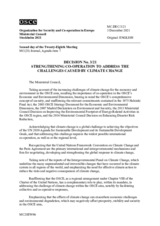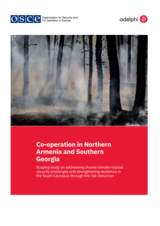
Climate change

The OSCE provides a platform for political dialogue to identify and reduce the security risks associated with climate change. To this end, the Organization conducts risk assessments, builds capacity and implements activities on the ground that seek to strengthen resilience and promote collaboration across borders and sectors.
Quick links
Overview
Targeted and collaborative action against climate change
The accelerating effects of climate change are shaping development and stability across the OSCE region. Surging temperatures, rising sea levels and more frequent and intense extreme weather events undermine livelihoods, heighten tensions over shared resources and deepen inequalities. Moreover, disruptions to major sectors, such as energy, agriculture and health, risk slowing economic growth and fueling discontent within and across borders. Targeted and collaborative action is essential not only to strengthen the resilience of critical systems but also to provide opportunities for cross-border and cross-sectoral co-operation. In doing so, climate action can help build trust, foster good neighbourly relations, and ultimately advance stability in the OSCE region.

Climate Change
Our work
Our thematic and programmatic tasks
The OSCE’s mandate on climate change is based on the 1975 Helsinki Final Act and rooted in commitments made by its participating States, acknowledging that climate change can exacerbate risks to security and stability. Ministerial Council decisions, most notably taken in Stockholm in 2021, have tasked the OSCE with supporting participating States in addressing climate-related risks, including through strengthening co-operation, dialogue and the exchange of best practices. As part of its comprehensive approach to security, the OSCE therefore provides platforms for dialogue and promotes collaborative action among its 57 participating States and other stakeholders to address climate-related challenges.
The OSCE provides a platform for political dialogue on the security risks associated with climate change. Through various formal and informal fora, the Organization offers venues for addressing climate change through the lens of a wide range of issues, such as disaster risk reduction, water diplomacy, energy and sustainable cities.
The OSCE also contributes to strengthening the evidence base on the cascading risks of climate change, builds the capacity of key stakeholders to address them and, together with its partners, implements activities on the ground to enhance resilience and reduce the potential security risks stemming from climate change. Examples of this work are participatory risk assessments in Central Asia, Eastern Europe, the South Caucasus and South-Eastern Europe; the identification and mapping of vulnerable geographical areas; and the development and joint implementation of transboundary adaptation measures for shared ecosystems.
Across all climate-related work, the OSCE upholds core principles of inclusion, participation and local ownership. This means promoting gender and age-sensitive approaches, ensuring that activities reflect community perspectives, and developing them in consultation with all relevant stakeholders.
Featured
Activities, news and other highlights

OSCE supports co-operation between Georgia and Armenia on Climate Change and Landscape Fire Management

Collaborative approaches to addressing illegal logging and strengthening climate resilience in the Shar/Šara Mountains and Korab Massif Area in focus at OSCE event

Report on Georgia-Azerbaijan co-operation for reducing climate-related security risks through joint landscape fire management launched at COP29 in Baku
News and activities
Current announcements, press releases, media advisories and other updates
Projects
Initiatives funded by individual states and organizations
Resources
Official OSCE documents, publications and other manually selected resources
Studies and reports
Reports, studies and analyses for policymakers, researchers and all those interested in this field of our work
Manuals and guides
Practice-oriented manuals, guides, handbooks and recommendations for policymakers and practitioners working in this field












